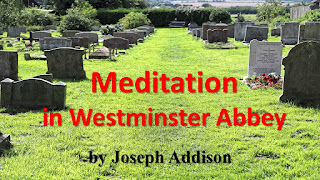Meditation
in Westminster
Abbey
by Joseph Addison
(Summary)
Joseph Addison was the essayist of ‘the age of
Pope’. The general characteristics of the age are:
·
The rise of
political parties
·
Clubs and coffee
houses
·
New publishing
houses
·
The rise of middle
class and
·
The new morality
The literary characteristics of the age are:
·
An age of prose
and reason
·
Satire
·
Classic age and
·
The literature of
the town.
Joseph Addison has contributed to the English essay
very much. In his essays there is a kind of social criticism and satire. He is
a humorist but his humor is impartial and noble. He is an essayist, moralist,
philosopher and a critic.
In this essay he wants to express that he can
improve himself with those objects, which others consider with terror.
In the essay he says, that he passes his time by
digging the graves, when he is in serious mood. When he looks at the graves of
two dates on them – the date of birth and of death, he considers the grave as
the satire on the departed person. He says, that the soldiers are given
sounding names in the heroic poems only because they may be killed.
When the essayist wonders in the Westminster Abbey,
he finds, that how men and women, friends and enemies and other people of
opposite groups are lying together in the same common mass. He finds, that some
of the epitaphs are extravagant while the others are so modest, that they are
written either in Greek or in Hebrew, and are not understood once in the 12
months. According to the essayist, a foreigner is very apt to conceive an idea
of the ignorance or the politeness of a nation, form the turn of their public
monuments. The essayist considers Dutch people far more superior to the English
people in the field of building monuments.
Addison says, that inscriptions are answerable to
the monuments. The inscriptions should be submitted to the perusal of learned
people before they are put in execution. The essayist knows that wondering in
the graveyard may raise dark and dismal thoughts in timorous minds but he can
improve himself, because while reading the different epitaphs, emotions of envy
and of inordinate desires goes out from him and he considers the great day when
all the people will be contemporaries.










0 Comments